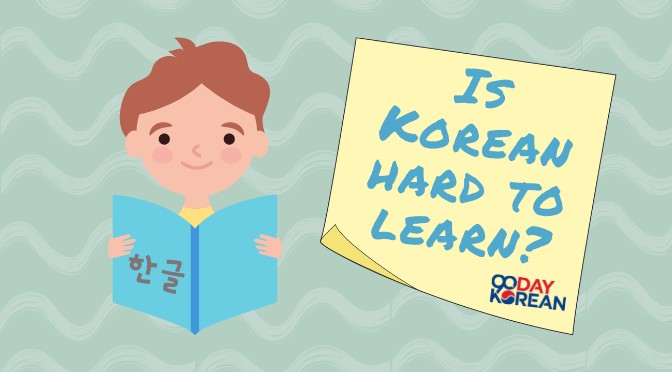Is Korean The Easiest Language To Learn? Many aspiring linguists ponder this question, especially with the surging global interest in Korean culture, fueled by K-Pop, K-Dramas, and Korean cinema. At LEARNS.EDU.VN, we believe that with the right approach and resources, learning Korean can be an enjoyable and achievable goal. This guide explores the various aspects of Korean language acquisition, offering insights and strategies to make your learning journey a success. Discover effective methods and resources at LEARNS.EDU.VN to master Korean vocabulary, grammar, and pronunciation.
1. Assessing the Ease of Learning Korean
Is Korean truly easy to learn? The answer, like with any language, isn’t a simple yes or no. Several factors influence the perceived difficulty, including your native language, prior language learning experience, and the resources you utilize. While a native Japanese speaker might find Korean relatively straightforward due to similarities in grammar and vocabulary, English speakers can also achieve fluency with dedication and the correct learning strategies. LEARNS.EDU.VN offers tailored resources to help learners of all backgrounds excel in Korean.
2. Understanding the Challenges and How to Overcome Them
While Korean has its challenges, understanding them is the first step toward overcoming them. Let’s explore some common hurdles and effective strategies to navigate them.
2.1. Mastering the Korean Alphabet (Hangeul)
Hangeul, the Korean alphabet, is often considered one of the most logical and efficient writing systems in the world. Comprising 14 consonants and 10 vowels, it’s phonetic, meaning that letters represent specific sounds. This allows learners to quickly decode and pronounce Korean words, even without understanding their meaning. LEARNS.EDU.VN provides interactive lessons and exercises to help you master Hangeul in a matter of hours.
2.2. Achieving Accurate Korean Pronunciation
Korean pronunciation is generally straightforward, with clear rules and a lack of tones, unlike languages like Mandarin Chinese. However, mastering the subtle nuances of Korean sounds requires practice and attention to detail. Focus on listening to native speakers and mimicking their pronunciation, paying attention to intonation and emphasis. LEARNS.EDU.VN offers audio and video resources featuring native speakers to help you refine your pronunciation skills.
2.3. Navigating Formal vs. Informal Korean
Korean distinguishes between formal and informal speech levels, which can be confusing for beginners. While textbooks often focus on formal language, everyday Korean used in conversations and media is often informal. It’s essential to learn both formal and informal expressions to communicate effectively in different contexts. LEARNS.EDU.VN provides practical lessons on navigating these speech levels, ensuring you’re prepared for real-life interactions.
2.4. Tackling Korean Grammar
Korean grammar differs significantly from English grammar, with a subject-object-verb (SOV) sentence structure and the use of particles to indicate grammatical functions. While this might seem daunting at first, the rules are consistent and logical. Focus on understanding the basic sentence structure and gradually introduce more complex grammatical concepts. LEARNS.EDU.VN offers clear and concise grammar explanations with ample examples to help you grasp the fundamentals.
2.5. Setting Realistic Timelines
One of the biggest challenges in language learning is maintaining motivation. Setting realistic timelines and celebrating your progress along the way is crucial. Avoid comparing yourself to others and focus on your own learning journey. LEARNS.EDU.VN provides tools to track your progress and set achievable goals, keeping you motivated and on track.
3. The English Speaker’s Perspective on Learning Korean
Is Korean hard to learn for English speakers? While Korean presents unique challenges for native English speakers due to its different writing system and sentence structure, it’s by no means insurmountable. By leveraging effective learning techniques and resources, English speakers can successfully acquire Korean proficiency.
3.1. Leveraging Associations
Connecting Korean sounds and words to familiar English sounds and words can significantly accelerate your learning process. This technique, known as using associations, helps you remember new vocabulary and pronunciation more easily. For example, the Korean word for “bus” (버스) sounds similar to the English word “bus,” making it easier to recall.
3.2. Mastering Sentence Structure
While the SOV sentence structure in Korean differs from the SVO structure in English, it’s relatively easy to learn and remember. Once you understand the basic structure, you can start plugging in Korean vocabulary to create simple sentences. LEARNS.EDU.VN offers interactive exercises to help you practice sentence construction and internalize the SOV order.
4. Estimating the Time Investment for Korean Fluency
How long does it take to learn Korean? The answer varies depending on your learning style, dedication, and goals. However, experts estimate that it takes approximately 1200 hours of study to achieve fluency in Korean. This translates to roughly two years of consistent study. LEARNS.EDU.VN provides resources and guidance to help you optimize your learning process and achieve your desired level of fluency efficiently.
5. Demystifying the Korean Alphabet: Is It Difficult?
Learning the Korean alphabet (Hangeul) is often the first step in learning Korean. Fortunately, Hangeul is widely considered to be one of the easiest alphabets to learn. With dedicated study, you can master Hangeul in just a few hours.
5.1. Recognizing Words Quickly
Within a short period, you’ll be able to recognize and read Korean words, even if you don’t understand their meaning. This early success can be incredibly motivating and encourages you to continue learning.
5.2. Consistent Practice
Consistent practice is key to solidifying your knowledge of Hangeul. Utilize flashcards, online quizzes, and handwriting exercises to reinforce your learning. LEARNS.EDU.VN offers a variety of practice materials to help you master Hangeul and build a strong foundation for your Korean language journey.
6. Korean Grammar: A Closer Look
While Korean grammar differs from English grammar, the basic rules are fairly straightforward. You can start forming simple sentences soon after learning Hangeul.
6.1. Simple Sentence Structure
A Korean sentence can be as simple as a single word, making it easy to start speaking from day one. As you progress, you can gradually learn more complex grammatical structures.
6.2. Navigating Honorifics and Speech Levels
Korean honorifics and speech levels can add complexity to the language, but they are an integral part of Korean culture. Focus on mastering the basic honorifics and gradually learn more nuanced expressions as you progress. LEARNS.EDU.VN provides comprehensive lessons on Korean honorifics and speech levels, explaining their usage in various social contexts.
7. Expanding Your Korean Vocabulary
Learning Korean vocabulary is an ongoing process, but there are effective strategies to accelerate your learning.
7.1. Utilizing Korean Word Families
Korean word families group words related to a specific topic, making it easier to learn and remember new vocabulary. For example, learning the words for different types of food or modes of transportation within a single family can significantly expand your vocabulary.
7.2. Recognizing Loan Words
Many Korean words are loanwords from other languages, including English, Japanese, Chinese, and Russian. Recognizing these loanwords can give you a head start in building your Korean vocabulary. LEARNS.EDU.VN offers a dedicated section on Konglish (Korean-English loanwords) to help you identify and learn these words quickly.
8. Korean vs. Japanese: Which Language is Easier to Learn?
The question of whether Korean or Japanese is easier to learn is a common one among language learners. Both languages have their own unique challenges and advantages.
8.1. Writing Systems
Korean utilizes Hangeul, a relatively simple and phonetic alphabet that can be learned quickly. Japanese, on the other hand, requires mastering three different writing systems: Hiragana, Katakana, and Kanji. Kanji, which are Chinese characters, can be particularly challenging due to the sheer number of characters to memorize.
8.2. Pronunciation
Japanese pronunciation is generally considered easier than Korean pronunciation, as it has fewer sounds and less tonal variation.
8.3. Grammar
The grammars of Korean and Japanese are similar, with both languages using a subject-object-verb sentence structure and particles to indicate grammatical functions.
Ultimately, the choice between learning Korean or Japanese depends on your personal interests and goals. If you’re drawn to Korean culture and music, then learning Korean might be a more motivating choice. If you’re interested in Japanese literature and history, then learning Japanese might be a better fit.
9. Accelerated Korean Learning Techniques
Want to learn Korean fast? There are several techniques you can use to accelerate your learning process.
9.1. Immersion
Immersing yourself in the Korean language and culture is one of the most effective ways to learn quickly. This can involve living in South Korea, surrounding yourself with Korean speakers, or consuming Korean media such as movies, dramas, and music.
9.2. Structured Learning
Enrolling in a structured language course, either online or offline, can provide you with a clear learning path and expert guidance. LEARNS.EDU.VN offers a variety of Korean language courses designed to meet the needs of learners at all levels.
9.3. Active Learning
Engage in active learning techniques such as speaking with native speakers, writing in Korean, and creating flashcards. The more actively you engage with the language, the faster you’ll learn.
10. Is Learning Korean Worth the Effort?
Is Korean worth learning? Absolutely! Despite the challenges, the rewards of learning Korean are immense.
10.1. Cultural Enrichment
Learning Korean opens doors to a deeper understanding and appreciation of Korean culture, including its rich history, traditions, and arts.
10.2. Career Opportunities
With the growing global influence of South Korea, proficiency in Korean can create valuable career opportunities in fields such as business, technology, translation, and tourism.
10.3. Personal Growth
Learning a new language expands your cognitive abilities, improves your memory, and enhances your problem-solving skills.
10.4. Travel and Connection
Being able to communicate in Korean enhances your travel experiences in South Korea and allows you to connect with Korean speakers on a deeper level.
Conclusion: Embracing the Korean Language Learning Journey
Learning Korean is a rewarding journey that can enrich your life in countless ways. While it may not be the absolute easiest language to learn, it is certainly achievable with dedication, the right resources, and a positive attitude. Remember to celebrate your progress along the way and embrace the challenges as opportunities for growth. Visit LEARNS.EDU.VN today to explore our comprehensive Korean language resources and embark on your own exciting Korean language adventure! Our resources at LEARNS.EDU.VN will help you overcome language barriers and achieve conversational fluency.
Unlock your potential and explore the Korean language and culture. Contact us at 123 Education Way, Learnville, CA 90210, United States, or via Whatsapp at +1 555-555-1212. Visit our website at LEARNS.EDU.VN for more information.
Frequently Asked Questions (FAQ) About Learning Korean
Here are some frequently asked questions about learning Korean:
| Question | Answer |
|---|---|
| Is Korean easy to learn for beginners? | While Korean presents some initial challenges like learning Hangeul, it’s achievable with dedication and the right resources. |
| How long does it take to become fluent in Korean? | Experts estimate around 1200 hours of study, but it varies depending on your learning style and goals. |
| Is Korean grammar difficult to master? | Basic Korean grammar is fairly straightforward, but honorifics and speech levels can add complexity. |
| What’s the best way to learn Korean vocabulary? | Utilize Korean word families, recognize loanwords, and use flashcards to expand your vocabulary efficiently. |
| Should I learn Korean or Japanese? | It depends on your personal interests and goals. Korean uses a simpler alphabet, while Japanese requires learning Kanji. |
| What are some fast ways to learn Korean? | Immerse yourself in the language, enroll in a structured course, and engage in active learning techniques. |
| Is learning Korean worth the effort? | Absolutely! It opens doors to cultural enrichment, career opportunities, and personal growth. |
| What are the best resources for learning Korean? | learns.edu.vn offers comprehensive resources, including lessons, exercises, and cultural insights. |
| Do I need to live in Korea to learn the language? | No, although immersion helps, online resources and dedicated study can lead to fluency from anywhere. |
| Is Korean pronunciation difficult? | Korean pronunciation is generally straightforward, but mastering the nuances requires practice and listening to native speakers. |


